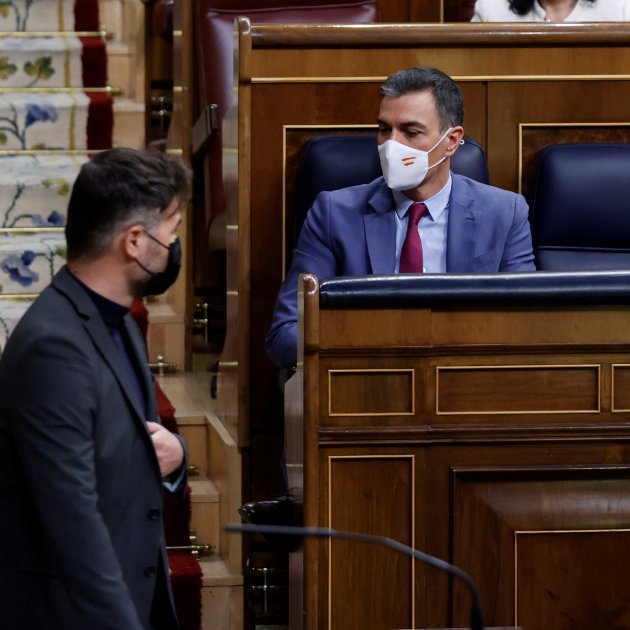The phones just won't stop ringing in the parliamentary offices of Spain's Congress of Deputies. Some calls are even unexpected, the same as the "casual" encounters in which pro-government MPs ask for voting support from the person they've bumped into. There's a reason: there are less than 48 hours to go till the debate and vote on the decree for the reform of Spain's labour law, led by minister Yolanda Díaz, a legislative change that continues hanging by the thread of the 'no' which parties like Catalonia's ERC, and the Basque parties PNV and EH Bildu have maintained. After the government's initial success with the decision by Ciudadanos to offer their votes for free, other small parties are now being surveyed by the executive to try and save the furniture. The message being conveyed from the Moncloa: they will get the votes they need and not a comma of the text will be touched - it will remain "in its terms".
During today's meeting, in fact, there were some favourable votes announced, such as those of Més País (2) and Compromís (1). To these must be added the yes of Ciudadanos (9), Teruel Existe (1), the Cantabrian regionalists (1), Coalición Canaria (1) and Nueva Canaries (1). But the numbers still don't add up. Faced with the rejection of the amendment by its traditional allies (ERC, the PNV and EH Bildu), the Sánchez executive is knocking on other doors, asking for vote in favour by the four deputies of the Catalan pro-independence party PDeCAT and the abstention of the two parliamentarians of Navarra Suma. Nothing is certain yet, although both the PSOE and Unidas Podemos are optimistic.
At the press conference after the weekly cabinet meeting this Tuesday, minister spokesperson Isabel Rodríguez reiterated the same message as in recent weeks: "It must be validated on its own terms," as the government agreed with the largest union groups and employers. The Socialist politician leader did not want to go into the details of the contacts being made these days and simply said that "the government is working in a coordinated and collaborative way to get these supports" and that the executive "is not considering any other scenario than that of it being approved." She asserted the "legitimacy" and "strength" of the current wording for having emerged from social dialogue.
She was accompanied at the press conference by Ione Belarra, who admitted that they are working more explicitly to get the support from their regular allies. However, the social rights minister and Podemos secretary general excused herself with the need for "discretion" and said that the teams needed to be allowed to work. She expressed her "maximum confidence" in second deputy prime minister Yolanda Diaz to obtain the votes needed.
Unsuccessful contacts
ERC sources have already stated in the last few hours that the situation of the vote looked "very bad" and that the PSOE was responsible for it. In this context, the Catalan party reiterated that they continued in the 'no' camp. Other pro-independence parties such as Junts, the CUP and EH Bildu have expressed the same position today. Junts spokesperson Míriam Nogueras revealed she had been contacted: “From the Socialist group. From Podemos, nobody”. But despite this, she has not seen any predisposition to make wording changes. On the other hand, the CUP's Mireia Vehí stated that "no one has called me". For its part, the PDeCAT, one of the parties sounded out by the Spanish government, explain that they are still in talks and will decide on Wednesday afternoon in a special executive meeting.
